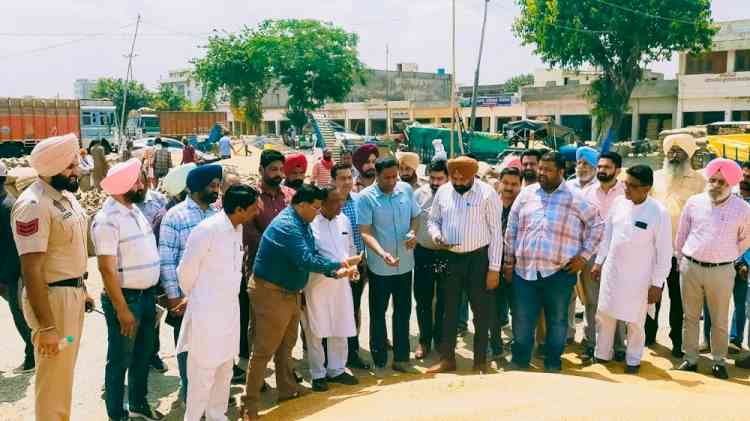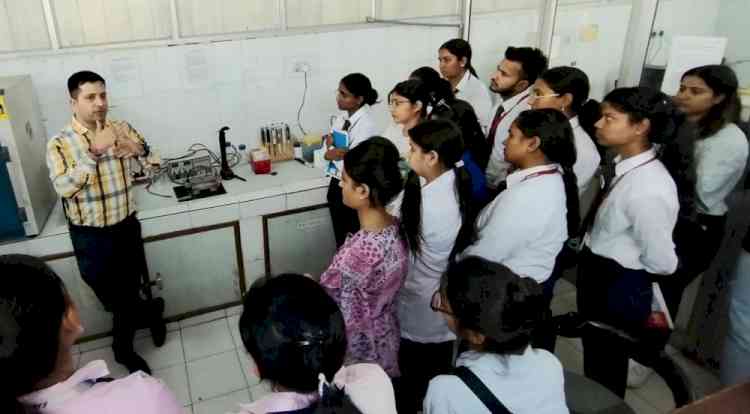Massive rally organized by Punjab Bank Employees’ Federation (Ludhiana Unit)

Ludhiana, October 22, 2019: On the call given by All India Bank Employees Association and Bank Employees Federation of India for strike on 22nd October 2019, a massive rally was organized by Punjab Bank Employees’ Federation (Ludhiana Unit) in front of Canara Bank, Bharat Nagar Chowk Ludhiana.
Com.D.P Maur, General Secretary Joint Trade Union Council Ludhiana and Com.Naresh Gaur, Secretary PBEF Ludhiana addressed the rally along with various leaders of PBEF, Com.Pawan Thakur, President, Com.Harvinder Singh, Com.Rajesh Verma, Com.Jarnail Singh, Com.Narkesar Rai, Com.Parveen Aggarwal, Com.Rajwinder Singh, Com.Balwant Rai, Com.Yuvraj Maria and other top leaders of Punjab Bank Employees Federation addressed the rally.
In a big bang announcement, Finance Minister informed the nation that 10 Public Sector Banks (PNB, Canara Bank, Union Bank of India, Indian Bank, United Bank of India, Allahabad Bank, Syndicate Bank, Corporation Bank, Oriental Bank of Commerce and Andhra Bank) will be merged into 4 Banks. The meaning is that 6 Banks ( United Bank of India, Allahabad Bank, Syndicate Bank, Corporation Bank, Oriental Bank of Commerce and Andhra Bank) will now get closed. Government may call it a merger but in reality it is cold-blooded murder of 6 Banks.
While addressing the rally Com Naresh Gaur said that, in this background, the public sector banks have a very special and pivotal role to play. Public sector banking was ushered into in our country when State Bank of India came into being in 1955. Thereafter, 14 major private banks nationalized in 1969 and another 6 private banks were nationalized in 1980. Thus public sector banks became the mainstay of Indian banking sector. These public sector banks have been playing a leading role in augmenting the precious savings of the people and deploying the same as credit to all the needy sectors of the economy. From a mere 8000 branches, today banks have grown into an industry with 90,000 branches. Branches have been opened in many nook and corner villages thus taking banking to the common people. From a total deposit of Rs. 5000 crores, today public sector banks have mobilized nearly Rs. 85 Lac crores as deposits. Similarly, from total loans and advances of Rs. 3500 crores, today public sector banks have extended loans to the extent of Rs. 60 lac crores. But unfortunately, in the name of new economic policies and liberalization of banking regulations, banking sector reforms are being pursued in the last 28 years by successive Governments. The main idea to de-regulate the banking sector and liberalise the existing controls. The attempt is to privatise these banks and hand over back to private sector. As responsible trade unions in the banking sector, we have been consistently opposing these reform measures. But the attempts to weaken public sector banks have continued and Government desires to pursue their agenda on banking reforms. The main agenda is to privatise the Banks and this would imply privatizing the huge and precious savings of the people. Hence we oppose any attempt to privatise the Banks. When the Government is contemplating to take the country towards 5 trillion economy, the role of banks is very critical to achieve this objective. Banks have to enlarge their credit portfolio in a big way. More and more loans and advances have to be given. Increase in credit depends upon availability of adequate capital. Hence, Government should adequately recapitalize all the Public Sector Banks. What we need in our country is expansion of banks and not consolidation of Banks.
The country is facing serious economic slowdown and downturn. Public Sector Banks with their huge resources at their command can play a decisive role to revive the economy. In fact, only last week, our FM has assigned important jobs for our Bank in boosting the economy. The decision to merge and close Banks is a total diversion from these tasks. Bank themselves face problems due to huge pile of bad loans. While the Public Sector Banks made a total gross profit of Rs. 150,000 crores for the year ended 31-3-2019, because of total provisions towards bad loans, etc. amounting to Rs. 2,16,000 crores, the Banks ended in a net loss of Rs. 66,000 crores. Can anyone believe that merger of Banks will result in recovery of the huge corporate bad loans? Rather, as we have observed after merger in SBI, bad loans in SBI has gone up. Same risk is facing these Banks now. Mergers will surely end in closure of branches. Closure of branches would mean more number of customer going to lesser number of branches and banking services would be severely affected. Customer population per bank branch will increase and affect efficient customer service.
In our country, where unemployment is a serious problem of the youth, Banks have been providing employment to thousands of educated youth every year. If Banks are merged and branches are closed, intake of staff will come down and hence employment opportunities will be seriously affected. To resolve the problem of bad loans facing the Banks, Government should take tough measures to recover the bad loans. Instead of that, the Government is trying to divert the attention and focus by resorting to merger of banks which is unwarranted. Bad Loans in the 10 Banks proposed to be merged today are Rs. 3,16,632 crores. Whether these bad loans will automatically be recovered if these Banks are merged? Big Banks will only help the big corporates. It is obvious that the Government, in the name of banking reforms, wants to enable the Banks to help the corporates.
Interest rate on bank deposits which represents the precious domestic savings of the people at large has been getting reduced year after year. Even the interest rate on savings has been reduced. Reduction of interest rate on deposits will dissuade savings and divert savings to consumption and speculation. When banks are expected to enlarge their loan portfolio, augmenting more deposits with fair rate of interest should be the policy and not reduction of interest rate on deposits. On the one side, borrowers who deliberately default their repayment of huge loans are being given all types of concessions and huge bad loans are being resolved with heavy haircuts for the banks and loss to the Banks, the burden of these losses are being shifted on the shoulders of the general customers of the banks. Penal charges are being levied on them for not maintaining minimum balance in their accounts when many of them struggle even for their minimum livelihood. Service charges have been hiked steeply in many banks on every type of service rendered to them. There is an urgent need to review the penal charges and service charges.
Universally, any process of merger, consolidation or amalgamation has resulted in reduction of staff. In fact, it is one of the purpose of mergers to ensure a lean organisation and achieve reduction in labour cost to show more profit. Hence mergers will result in staff redundancy and threaten job security besides drastically reducing future job potential thus depriving the youth to get jobs.
While the business of the Banks have gone up, while more number of branches have been opened, while the workload in the branches has gone up, the number of workmen employees are getting reduced in all the Banks. These vacancies are not being filled up. The recruitment of staff in the Banks is coming down year after year. Regular and permanent jobs in the Banks are being outsourced on contractual basis. There is an urgent need to adequately recruit employees in all the Banks, urged the Speakers.

 cityairnews
cityairnews 

















